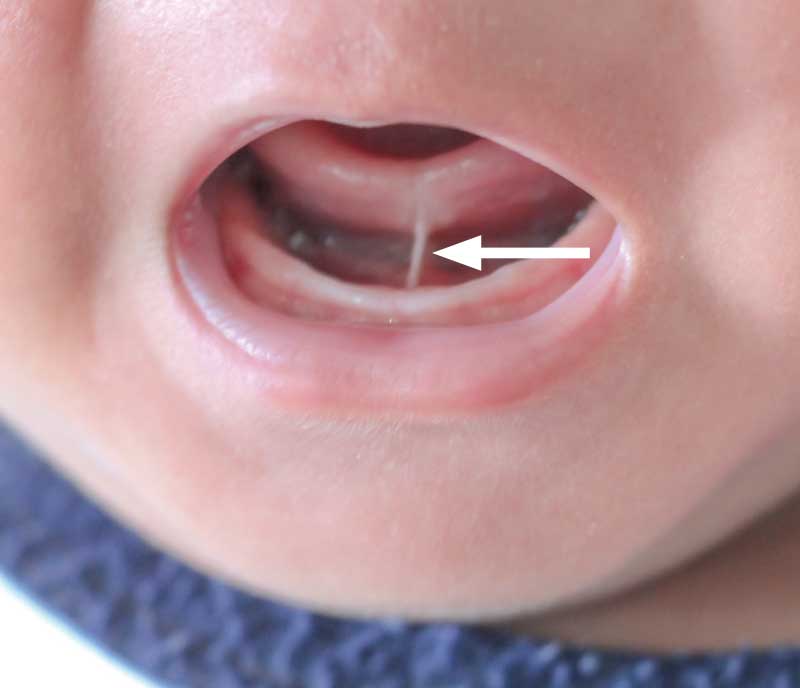Tongue Ties, Lip Ties and Breastfeeding
How common oral abnormalities can interfere with nursing
Dear Doctor,
My 6-week-old nephew is going to have a "tongue release" to help him breastfeed. Is oral surgery on a tiny baby really the best way to solve this problem?
Dear Jackson,
I can understand your concern: The thought of a newborn undergoing surgery can be a scary one. But let me assure you that a "tongue release" to facilitate breastfeeding is usually a very minor in-office procedure that takes only a few minutes and causes very little discomfort. While I can't comment on your nephew's case specifically since I haven't examined him, I can say that many times a surgical approach is the best way to allow a baby to nurse at the breast effectively. Let's examine why.
 |
| A tongue tie might cause a baby to compensate by chewing the mother's nipple instead of sucking it—leading to a sore mom, a hungry baby, and frustration all around. |
Breastfeeding success depends on a good seal between the baby's mouth and the mother's nipple. But some babies have a slight oral abnormality that makes this very difficult. It involves one of the small bands of tissue called a frenum (or frenulum), which connects a soft part of the mouth to a more rigid one. For example, there is a frenum that attaches the upper lip to the gum tissue; another connects the tongue to the floor of the mouth.
If a frenum is too short, thick or tight, it can restrict movement of the lip or tongue and prevent the baby from getting a good seal on the nipple and drawing milk out of the breast. The baby might compensate by chewing the mother's nipple instead of sucking it—leading to a sore mom, a hungry baby, and frustration all around. This condition is sometimes referred to as a "lip tie" or "tongue tie" (ankyloglossia). Estimates of its prevalence range from about 4% to 11% of the population. Ankyloglossia is more common in boys than girls and tends to run in families.
The procedure to loosen a frenum can be referred to as a frenotomy, frenectomy or frenuplasty, depending on exactly what is done. But it is often referred to simply as a tongue release or lip release. Usually no sedation is required for the child. The baby is wrapped comfortably in a blanket and held in a chair by a dental assistant. A topical numbing gel is then applied to the area under the tongue. For a particularly thick frenum, a local anesthetic might be administered by injection. However, this is not usually needed because a frenum has few nerves or blood vessels.
After the numbing agent has been given a few minutes to take effect, the baby's tongue is gently extended and the frenum is snipped with a surgical scissors or laser. I prefer the latter method because there is less chance of bleeding or discomfort to the baby. There's also virtually no post-op care required since the laser seals the wound as it cuts. Immediately after the procedure, the baby is returned to the parent and can nurse right away. However, there can be an adjustment period as the baby learns to use his newly freed tongue.
The parents should follow up with their pediatrician and/or lactation consultant to make sure the baby learns to nurse successfully. That's because having a tongue tie has essentially trained his muscles to work incorrectly. It can be easier to re-train these muscles if a tongue release is performed sooner rather than later. So it's a good idea to have a baby evaluated by a pediatric dentist or other specialist as soon as this problem is suspected.
Tongue ties and lip ties that don't interfere with feeding may need surgical treatment later on for other reasons. For example, a tongue tie may cause a speech impediment by preventing a child from making sounds that involve touching the tongue to the roof of the mouth. A lip tie may cause a gap between the two front teeth, which can be corrected by orthodontics in conjunction with a lip release. Performing frenectomies on older children may require some form of sedation, though the procedure can still usually be completed in the dental office. The risks and benefits of any surgery, even minor outpatient procedures, should always be discussed with a child's own healthcare provider.
It should be noted that a tongue-tied baby may still be fed with a bottle and can take in enough nutrients to grow and thrive. Yet the American Academy of Pediatrics and many other organizations recommend breastfeeding for the optimal well-being of both mother and child. That's why so many parents try to make it work—even if surgical or other treatments are needed. Fortunately, tongue-release surgery at the dental office can help make nursing an option when it would otherwise be impossible.



